Do you want to become a better version of yourself?
The school system made learning something many people try to avoid.
We did it for the grades.
Now it’s different.
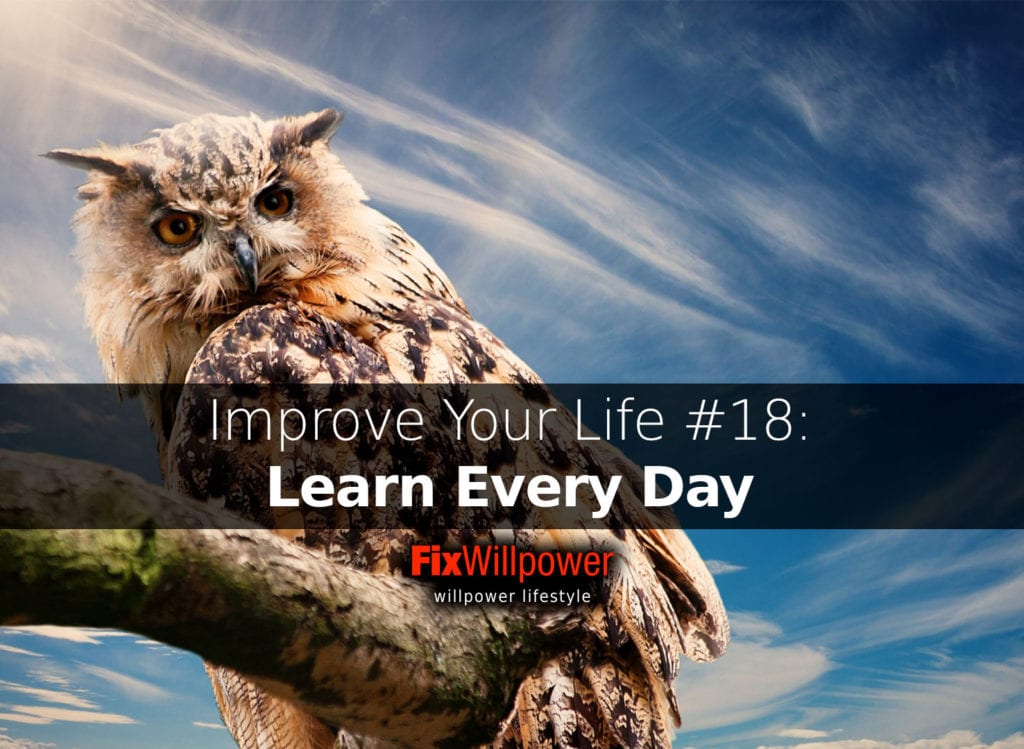
For most there’s no tremendous excitement associated with learning. I have noticed that as I get older and the memories of the school system are less vivid; I enjoy learning more and more.
You can start just by reading interesting books for fun and entertainment. For me, it was:
- astronomy and cosmology,
- marketing,
- productivity and decision making,
- psychology and neuroscience.
The more you learn, the more you see how new knowledge makes your world larger. You will understand how seemingly unrelated topics connect.
You don’t have to read practical stuff. Reading about quantum theory will not give you insights on how to get a promotion at work. But it will fill you with the sense of wonder and build the neural connections in your brain. More connections in the brain and the sense of wonder may lead to better employment opportunities.
When you know a little about a lot then you will come up with more creative solutions to the problems you face in your work and personal life.
The First 20 Hours: How to Learn Anything [VIDEO]
In this video, Josh Kaufman shows that you can get pretty good at anything in about 20 hours.
The form of learning you choose is totally up to you. There are three primary sources of learning:
1. Learn from people around you
You can learn facts and skills from the people around you.
What your friends are good at? Is there something your co-worker does exceptionally well? Ask them to share their experiences with you. Learn something from your kid. The older they get, the more surprised you will be about the things they know.
Your parents and grandparents can teach you how they did things when there was no internet. The facts and knowledge are one side of learning from people.
People can also teach you how they feel, the emotional side. How do they feel about things, ideas, events, and other people? Why does your friend love winter and snowboarding, but that other guy can only think of warm places and laying on the beach?
Why some people love comedy and others horror, this kind of learning will expand your emotional horizon and help you better understand the people you meet along the way.
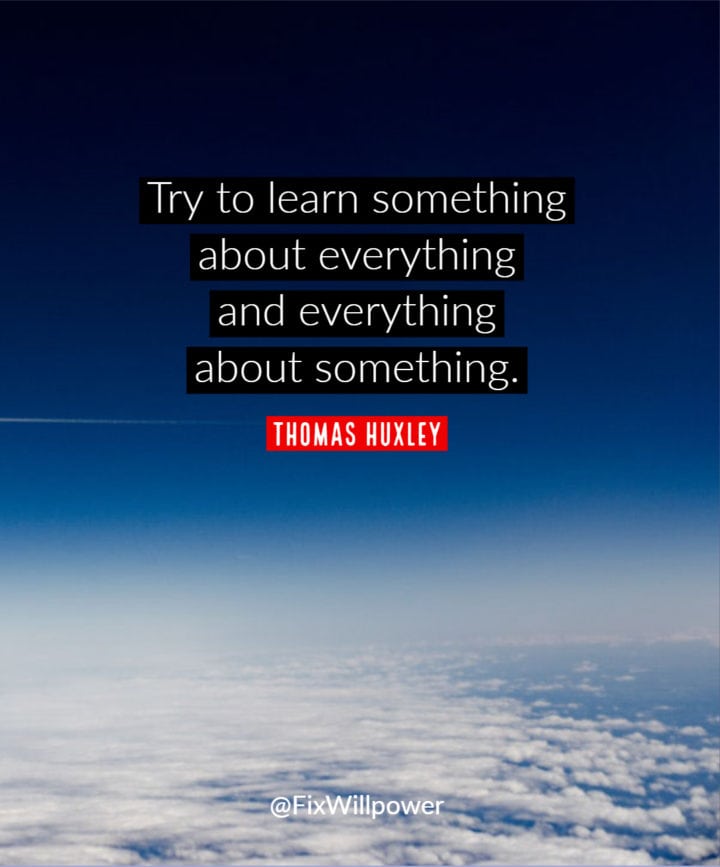
Try to learn something about everything and everything about something. ~ Thomas Huxley
2. Learn from experience
If something happens to you, use it as an opportunity to learn. Usually, we tend to learn more from negative experiences as we are too busy celebrating in positive cases. Decide to learn from every experience you have, and you can say you “win some or learn some.” Try to internalize the following sequence when you encounter something strange:
Surprise
Strange events engage our fight-or-flight response. Many people react to an unexpected event fearfully. People may also get angry or aggressive. Change that and try to react with open-minded surprise.
Interest
Why did that strange thing happen? Try to understand the reasons behind the events that unroll. Keep calm and react in a way appropriate for the situation.
Learn
When the situation has passed, reflect on what happened, how you reacted, and what you can learn from it.
If you can avoid your automatic responses in unexpected situations, you are better equipped to deal with them. Reflecting on what happened helps you internalize what you learned. As a result, you will be better equipped to deal with similar situations in the future.
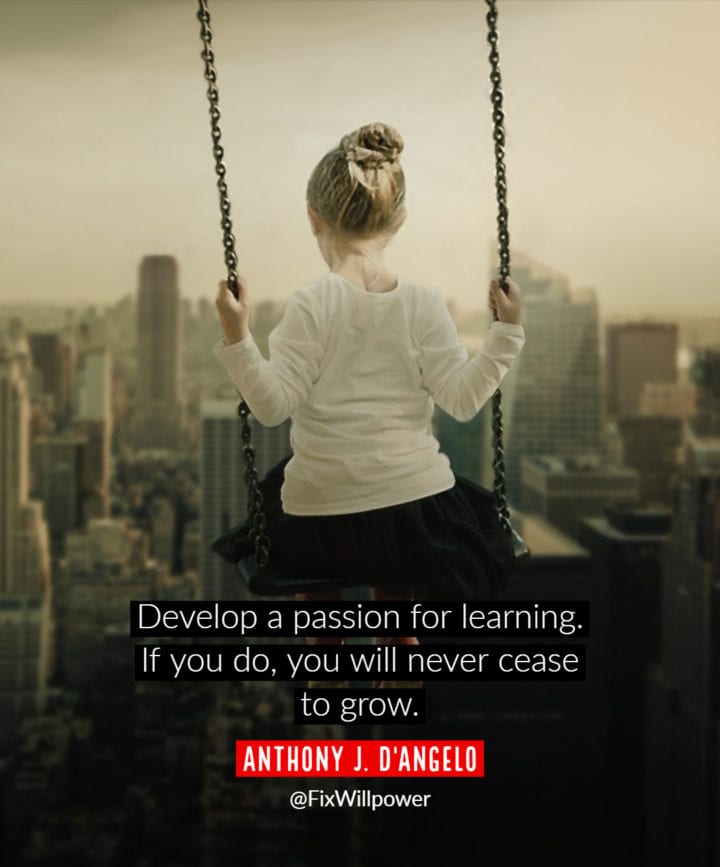
Develop a passion for learning. If you do, you will never cease to grow. ~ Anthony J. D’Angelo
3. Use learning resources
Read a book, take a course online or off, watch a documentary, get information from websites and blogs. With the advent of the internet, almost all the information in the world is accessible to everyone with a connected device. You can get ebooks and audiobooks from Amazon and other sources for nothing. Get audiobooks and turn your transit times to the university on the go.
Just the other day, I decided that it’s time to read the foundation of Western literature Iliad by Homer (not the yellow one). The price for the Kindle edition? $ZERO. Delivery time? Instant.
You can start right here: how to increase your willpower and improve your life.
Try new things every day
If you learn something from a book or a person, then try to apply it hands-on. See if it works, how can you improve it, do you like it? Keep at the things you like and toss the others replacing them with something new.
But if you are trying something, don’t give up too quickly. I have seen many people who try something once and quit saying it’s not something for them. The “not for me” reaction is because they haven’t mastered the skill yet. When I learned to snowboard, I was more on the ground than on the board. It took a lot of time to get halfway decent at snowboarding, but it was worth it.
I don’t sing. At all. My friends went to a karaoke joint in Tokyo. Everybody had to sing. I’m still amazed that they didn’t call the police when I sang. Luck, I guess.
I can’t say that singing is “not for me.” If I want to sing, I have to put in the work and learn to sing. It’s my decision if I want to spend the time it takes.
Try everything that seems interesting and fun. Keep at it long enough to understand if this is something for you. Try new things all the time. Try things that are weird and unexpected.
Try things you don’t have a talent for.
But above all else, try to keep it fun!
How to remember what you learn
Repetition is the key to long-term learning. When you encounter new knowledge once, you will probably forget it. Repeat what you learned, and you will reinforce the new patterns in your brain. Here are three techniques that help you retain what you learned:
Recall
Right after you finish the material you are learning, stop and think, what you learned. Look away and recall what you read or watched for 30 seconds or a minute. Extra points for creating flashcards with a tool like Anki.
Spaced repetition
Practice strengthening the neural connections. Knowledge in the brain is like a muscle. Repeat the things that you want to keep. Repeat the material in 3 or 4 days. Re-read, recall, and use the Feynman technique.
Feynman technique
- Read something you want to understand and remember
- Write an explanation as if you were teaching it to someone else who didn’t understand the subject. Using analogs is a great technique for that.
- Whenever you get to the parts you don’t understand or remember, go back to the material and re-learn, fill in the gaps in your knowledge until you can write an explanation without using the source material.
- Simplify your writing. Get rid of the technical and convoluted language. Make everything as simple as possible.
Start a blog
When you learn something, you can tie all the techniques together as blog posts. You write posts for your audience and learn at the same time.
With a blog, you can implement the Feynman technique. When you do it publicly, then you feel accountable and put more effort into your learning process. At the same time, blogging will help with consistency if you promise your audience to post regularly.
The person you are teaching can be your kid or mother, or a friend.
Their feedback helps you understand where you are not clear enough. These may be the areas where you need to learn more to get clarity.
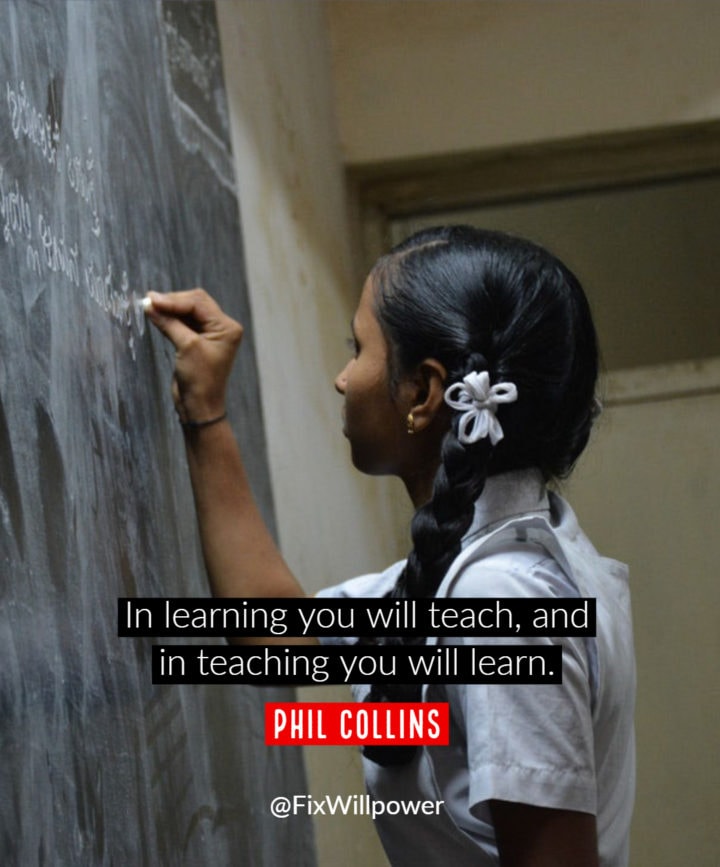
In learning you will teach, and in teaching you will learn. – Phil Collins
Curiosity is the key to knowledge
One of the most important character traits you can have is curiosity.
- Do you know why the pot makes noise when you boil water?
- Do you know why the sky is blue?
- Do you know what is the best way to remember new knowledge?
Most people just think about it and then let it go.
Don’t be that person!
If a question of some interest comes to your attention, then find out what the answer is.
Now go find out the answer for one of the questions above.
The questions don’t even have to make sense. For example, the other day I wanted to know how thick is the disk of the flat Earth. I spent several minutes trying to figure it out. Turns out flat Earth people don’t think this is an important question and they don’t have an answer.
When I was a kid, my mother tried to answer my every question. When she didn’t know the answer, she asked from other people.
Don’t say, “Hmm, interesting question…” and leave it at that.
Find out the answer!
Finding answers grows your curiosity muscle and expands the range of your knowledge.
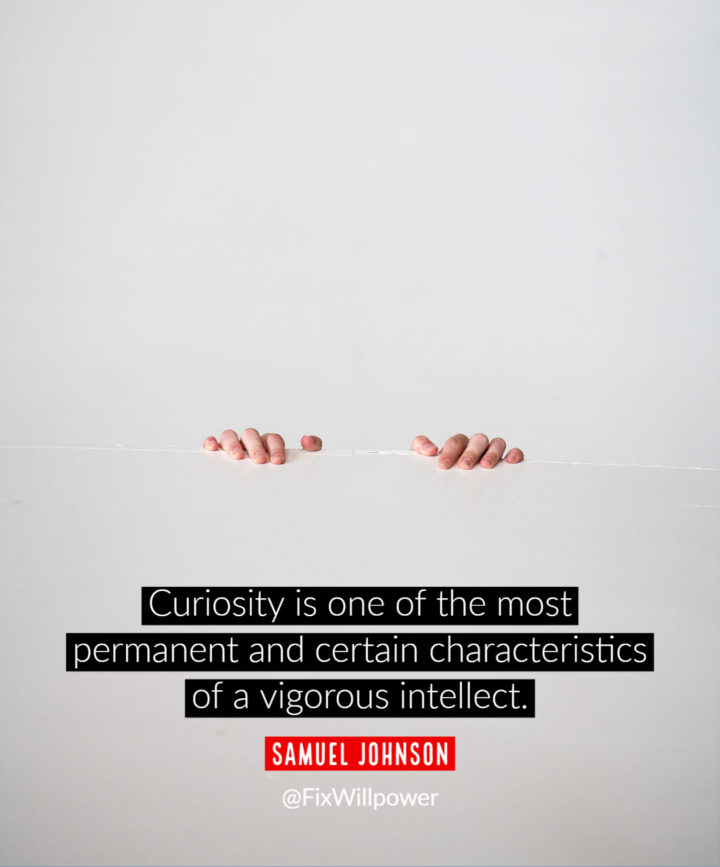
Curiosity is one of the most permanent and certain characteristics of a vigorous intellect. ~ Samuel Johnson
Learn, but don’t forget to play
If you learn something, teach others. Teaching will make your newfound knowledge stick better. Set a time limit. Depending on your habits, surfing Wikipedia may take you hours upon hours. Don’t forget to sleep and socialize.
I often find that I’m competitive in almost everything I do.
I have to constantly remind myself that sometimes you can do things just for fun. If you pick up a guitar, you don’t have to become Steve Vai. You don’t even have to play to others, ever.
Set goals
Your first goal is to have fun.
After that, you may consider how deep you want to go into a particular topic. You don’t have to become a master of Greek literature. Just have fun and try to understand how what you just read has influenced history over the past 28 hundred years.
Set yourself a goal of learning something new every day or week.
Oh, you don’t have the time?
Stop watching TV and scrolling the newsfeed!
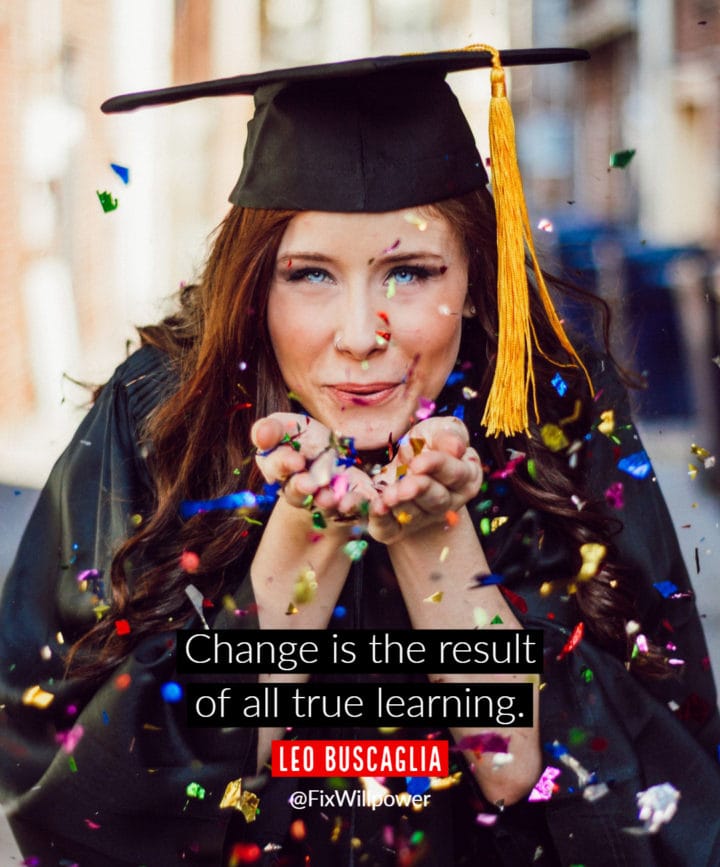
Change is the end result of all true learning. ~ Leo Buscaglia
Now, go and learn something new.
_____________________________
Image: NGC 224 / Great Nebula in Andromeda / M 31 by Torben Hansen
Image: Thomas Henry Huxley by Ernest Edwards (1837—1903)
Photo on Visualhunt


![Read more about the article Let It Go, You Don’t Have to Win Every Time [VIDEO]](https://fixwillpower.com/wp-content/uploads/let-it-go-429x314.jpg)
![Read more about the article How Self-Affirmations Make You More Confident [and Less Anxious]?](https://fixwillpower.com/wp-content/uploads/self-affirmations-429x314.jpg)
![Read more about the article My Meditation Experience [2000+Days] What Can You Learn?](https://fixwillpower.com/wp-content/uploads/meditation-experience-429x314.jpg)
![Read more about the article Call An Old Friend to Keep in Touch and Build Your Network [STEPS]](https://fixwillpower.com/wp-content/uploads/call-an-old-friend-429x314.jpg)
Pingback: The First 20 Hours: How to Learn Anything by Josh Kaufman [TED VIDEO] | Fix Willpower
Pingback: Improve Your Life #30: Pick Your Own Path | Fix Willpower